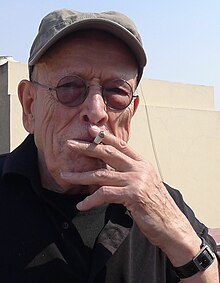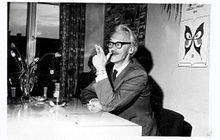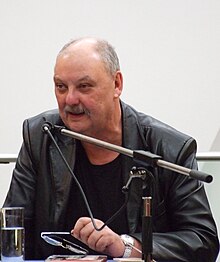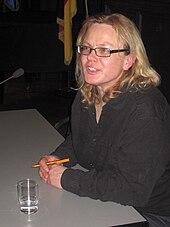International short story colloquium
The International Short Stories Colloquium , also known as the International Writers ' Colloquium , initially held by the city of Neheim-Hüsten and since the municipal reorganization of the city of Arnsberg , was an international writers' meeting. In this context, a German and an international short story prize were awarded. The colloquium arose from a writers' meeting first held in 1965. The last colloquium took place in 1994.
General
It was one of the few literary events dedicated to the short story genre . " The colloquium is not only characterized by the establishment of contact with the reader, it also confidently ignored the dead statements of the genre and the one-sided notion that the German short story is tied to the war experience, which is to be portrayed realistically and critically. .. Apart from the repeatedly observed renunciation of decisive form criteria ... the awards at this colloquium show, apart from the aversion to a normative definition, the constant effort to promote the further development of the genre. "
It was also important that even during the East-West conflict, not only participants from the western world but also from Eastern Europe took part. " The symposium, combined with an award ceremony, is, as far as I know, the only writers' meeting in Europe that cultivates the East-West dialogue on a broad basis ... " ( Westdeutsche Allgemeine Zeitung )
The contact with citizens through readings in everyday places was also emphasized again and again. During that time, Dieter E. Zimmer wrote a rather critical, exaggerated article about one of these meetings. As for the participants, he says that most of the authors present come from the wider area. Almost all of the foreigners came from the Eastern Bloc and were delegates from their writers' associations. And to try to involve the population: " One reads in the counter of a savings bank: Customers come and go, pay in and withdraw, and next to it a man with a beard is sitting and reading something, two students and a woman keep him company. How I wanted citizens to vote on the publicly displayed stories in number 20. I suspect that if someone sees us here, he thinks we are a bunch of idiots in Sauerland, for a company outing to an asylum for the culturally disturbed. But there are also authors who return from their readings with feelings of triumph. "
Various prizes were awarded. In addition to a German one, an international short story prize was awarded. These were last endowed with 10,000 DM each. The mode of anonymous awarding of prizes ensured that not only established and well-known writers but also young authors had a chance. The texts were published under the series title Findings.
Beginnings as a writers' meeting
As early as 1957, on the initiative of the head of the Neheim-Hüstener Volkshochschule Dr. Konrad Maria Krug held a working discussion between Westphalian authors on the subject of "The self-image of the poet in our time". On the initiative of his successor Dr. Hartwig Kleinholz held a writers' meeting for the first time in 1965. Participants were: Heinrich Maria Denneborg , Max von der Grün , Wolfgang Hädecke , Kay Hoff , Norbert Johannimloh , Hugo Ernst Buyer , Ernst Meister , Heinrich Ost , Josef Reding , Heinrich Schirmbeck , Wolf Simeret , Erwin Sylvanus and Horst Wolff .
The meeting lasted three days. The focus was on presentations and subsequent sometimes controversial discussions. In addition, the authors wrote poetry or prose on various topics. The texts were discussed during the colloquium without naming the authors. The anonymity guaranteed that every text could be rated regardless of the reputation of the author.
In 1967, the following took part in the second writers' meeting: André Claeys , Oldřich Daněk , André Demedts , Lucien Dendooven , Fred Germonprez , Walter Gross , Max von der Grün , Wolfgang Hädecke , GH Herzog, Anton Hykisch , Daan Ingelram , Norbert Johannimloh , Jiří Marek , Ernst Meister , Eduard Petiška , Josef Reding , Raf Seys , Ria Scarphout , Willy Spillebeen , Erwin Sylvanus , Jan Trefulka , Paul Vanderschaeghe and Jan Vercammen .
Short story colloquium
1969 Colloquium
In 1969 the writers 'meeting became the International Writers' Colloquium. Participants were: Hans Günther Adler , Günter Braun , Johanna Braun , Inger Christensen , Walter Gross , Max von der Grün , Kay Hoff , Anton Hykisch , Ivan Ivanji , Urs Jaeggi , Norbert Johannimloh , Anise Koltz , Angelika Mechtel , Ernst Meister , Sascha Alexander Petrovic , Armand Pierhal , Hana Prosková , Josef Reding , Erwin Sylvanus , Friedel Thiekötter , Gabriele Wohmann and Jan de Zanger .
In this context, the International Short Stories Prize of the City of Neheim-Hüsten was awarded by a jury for the first time. As at the writers' meeting, the contributions were made anonymously to the jury members. The first prize went to Gabriele Wohmann for the contribution "From the white and blue diary." Johanna Barun and Friedel Thiekötter each won a second prize.
Colloquium 1971
The following took part in the second International Writers' Colloquium in 1971: Walter Alexander Bauer , Johanna Braun , Georges Cosme , Francis Esquier , Kornel Filipowicz , Jerzy Gieraltowski , Frank Göhre , Wolfgang Hädecke , Norbert Johannimloh , Gert Jonke , Siegfried Kessemeier , Wolfgang Körner , Jiří Marek , Ernst Meister , Marianello Marianelli , Christoph Meckel , Hans Mohler , David Rosenberg , Herbert Rosendorfer , Michal Rusinek , Erwin Sylvanus , Friedel Thiekötter , Karin Voigt and Eva Zeller .
Prize winners were Günther Radke and Christoph Meckel. The local association savings bank awarded a prize for a translated short story for the first time. The winner was Gabriel Laub . For the first time, a student jury also awarded a prize. Eva Zeller was the winner.
Colloquium 1973
According to a report by the weekly newspaper Die Zeit, 55 authors and critics from twenty countries took part in the third colloquium . An international jury awarded a German and an international short story prize endowed with DM 3,000 each. Around 200 stories were received in advance. Sixteen international and 30 German contributions were shortlisted. In addition to the main prizes, there was again a student award and, for the first time, an audience award.
In addition, numerous readings by the authors took place in bookshops, schools, hospitals and other institutions. This type of readings throughout the city was continued at the following events.
The winners were Werner Dürrson , Friedel Thiekötter and Radomir Smiljanic .
1975 Colloquium

As a result of the local reorganization, the city of Arnsberg has hosted the colloquium since 1975. The participants included: Radomir Smiljanic , Ilse Tielsch-Felzmann , Frank Göhre , Dezsó Monoszlóy , Lázló Czimbalmos , Volker W. Degener , Erich Kock , Michael Krüger , Arnold Leifert , Walter Neumann , Marek Nowakowski , Herbert Rosendorfer , Erwin Sylvanus , Hannelies , Bernd Wördehöff , Jan de Zanger and Eva Zeller .
The International Prize went to Radomir Smiljanic and the German Prize went to Ilse Tielsch-Felzmann. The student jury honored Frank Göhre, Dezsö Monoslóy and Lázló Czimbalmos.
Colloquium 1977
The fifth colloquium was attended by: Marek Nowakowski , Ernst Nowak , Josef Reding , Jiří Marek , Harald Bronstering , Wilhelm Damwerth , Herbert Eisenreich , Dimiter Jaremov , Norbert Johannimloh , Marianello Marianelli , John Matthew Mitchell , DR Popescu, René Regenass and Eva Zeller .
The International Short Story Prize went to Marek Nowakowski and the German Prize to Ernst Nowak. The students honored Josef Reding and Jiri Marek.
Colloquium 1979
The sixth colloquium was attended by: Alexander Bauer , Ulf Abraham , Dragan Aleksic , Urs Berner , Harald Bronstering , Volker W. Degener , Werner Dürrson , Silvia Gloe , Christine Haidegger , Nikolai Haitov , Matthias Hoffmann , Hanne F. Juritz , Gyula Kurucz , Klaus D. Mahn , Marianello Marianelli , Tibor Méray , John Matthew Mitchell , Walter Neumann , Michael Rusinek , Dieter Schliwka , Wolfgang Thon , Hannelore Valencak and Sigrid Wilts-Grunert .
The International Short Story Award went to Marianello Marianelli and Nikolai Haitov. It is noteworthy that the German short story award with Matthias Hoffmann went to a high school student. The student jury prize went to Tibor Méray Hanne F. Juritz. The citizens' award went to Klaus D. Mahn and Nikolai Haitov.
Colloquium 1981
The seventh colloquium included: Josef Reding , Renate Fueß , Ottó Jávor , Sigrid Wilts-Grunert , Kornel Filipowicz , Andrzej Pastuszek , Otto Brand , John Matthew Mitchell , Günter Radtke , Marek Nowakowski and Alois Brandstetter .
The winners of the German Short Story Prize were Josef Reding, Renate Fueß and Alois Brandstetter. The international short story award went to Ottó Jávor. The student jury honored Sigrid Wilts-Grunert and Kornel Filipowicz.
Colloquium 1983
Participants in the eighth colloquium were: Ingeborg Kaiser , Werner Dürrson , Ivan Ivanji , Christine Haidegger , Ambrus Bor , Eva Zeller , Haeng-Sook Lee , Almuth Link , Peter Grosz , Marianello Marianelli , Gabriele Lins , Marius Tupan , Theo Schmich , Gyula Kurucz , Hans van Ooyen and Franz Storch .
Ingeborg Kaiser and Werner Dürrson were the winners of the German Short Story Prize. The international award went to Ivan Ivanji. The student jury honored Christine Haidegger and Ivan Ivanji.
1985 Colloquium
The prize money for the German and the international short story prize was 10,000 marks each. While the German short story prize was paid by the city of Arnsberg, the Sparkasse Arnsberg-Sundern took over the prize money for the international prize and the student prize, which was endowed with DM 3,000. In addition to the memory of the founder of the series of events, the Clasvogt company donated the Hartwig Kleinholz Prize, endowed with DM 5000.
The magazine Der Literat judged the event: " The openness that has always been striven for between writers and the reading public has never been so conspicuously demonstrated as it was at the ninth colloquium during the last days of April 1985. Both the opening event and the award ceremony were not only As usual, accessible to everyone free of charge, but were also eagerly attended, as well as the numerous readings ... and not to forget the working groups in which one endeavored to interpret the competition texts or thought about the responsible role of the writer in of our time. No wonder that the authors, who were also guests in various schools, never tired of praising the active participation of the population and the intelligent questions, especially among young people. "
Participants were Gabriela Adameşteanu , Carmen-Francesca Banciu , Tito Bilopavlovic , Ambrus Bor , Iwailo Ditschew , Dusan Dusek , Marjaleena Lembcke-Heiskanen , Anatol Johansen , Heinz Knappe , Walter Laufenberg , Jürgen Lodemann , John M. Mitchell and others.
Hannelies Taschau won the German short story award, Carmen-Francesca Banciu won the international award. Winning the award led to the author's publication in Romania.
Colloquium 1987
As part of the 1987 colloquium, the workshop gallery Der Bogen organized a thematic exhibition entitled Readabilities. During the opening of the exhibition, participants in the colloquium read from their works.
Participants were Karl Domanowsky , Texia Farina , Joachim Klinger , Jan Koprowski , Gabriel Laub , John Linthicum , Helga Lippelt , Monika Littau , Gertrud Neuling , Grozdana Olujic , Hans van Ooyen , Günter Radtke, Sadettin Simsek and Meng Weizai .
Gabriel Laub and Hans van Ooyen won the German short story award in equal parts. The international award went to Texia Farina. Grozdana Olujic received the student award.
Colloquium 1989
Participants included Günter Braun and Johanna Braun , Walter Laufenberg , Kostas Karaoulis , Marian Grzesczak and others. 900 texts from 28 countries were submitted as competition entries. In the year of the fall of the Wall, the Hamburger Abendblatt considered it remarkable that half of the shared German Short Story Prize went to the Braun couple from Magdeburg . The other half went to Walter Laufenberg. The Hartwig Kleinholz Prize also went to the Braun couple. The international award went to Marian Grzesczak. The student award was also shared. Half went to Kostas Karaoulis and the other half to Walter Laufenberg.
Colloquia 1991 and 1994
Karen Duve and Markus R. Weber participated in the 1991 colloquium . Duve received the first prize for young prose and the Hartwig Kleinholz Prize. The last colloquium took place in 1994. Herta Müller, winner of the Nobel Prize for Literature, was among the jury members .
resonance
The colloquium and the prizes received received considerable attention in the national and international press.
- "The custom at the Arnsberg Colloquia also includes encounters between the authors and the school youth and the working population. They allow an insight into the reading interests of the older and younger generations in Germany and provide material for comparisons ... I believe in one In certain respects the European youth has become very similar. Everywhere we see a crisis of authorities, a critical attitude towards the generation of fathers ... As always, the organization was brilliant this time too: everything worked and we had a little time to talk to the people and see the Westphalian landscape .. " (Literatura, Warsaw )
- This German and international competition can certainly measure up to the short film festival in Oberhausen ... (Politika, Belgrade )
- This award, which has received a lot of attention and has received literary laurels, is not the essence of the symposium. "A European oasis" is what the award winner Marianelli called it, where friends and colleagues meet where it is worthwhile to come back ... Where else do authors read, for example in kindergarten or in the counter of a bank ... Where else can authors come from? Encounter East and West and try to communicate regardless of social literary locations. ( Basler Zeitung )
- It is truly unique when ... writers from ... countries of different social order and literary tradition have sought a common language ... Bulgaria traditionally participates in this conversation about the state, tendencies and perspectives of the short prose form. The great interest that the world press showed in this forum should also be emphasized. (Literatures Front, Sofia )
- It should not be overlooked that the meeting in Arnsberg is by no means free from misguided ambition as a writer and functionaries. However, both are pleasantly limited, the workshop character of the critical discussions is largely preserved, the literary, craft locations shape the course of the encounters, including numerous public readings by authors. ( German Press Agency )
- The small town is a province only geographically. Their cultural policy, on the other hand, the idea of a public symposium, is unique in Europe. It enables writers (...) who come from different social systems to meet. A European oasis where "open door literature" is practiced for a limited time. Numerous readings, also in pubs or hospitals, and discussions with the citizens of the city tear down the hurdles between authors and readers. In Arnsberg literature is ... close to the citizen. " ( Swiss feuilleton service )
- Nowhere else in the Federal Republic is the "literary occupation child", as Durzak described the short story, which has grown into an important means of expression in post-war Germany under the influence of the Americans, the subject of public discussion every two years. Nowhere else do authors from all over the world have the chance to present their texts not only to a jury, but also to writing colleagues and the public of all ages present at the events; a process that can bring about a learning process in both directions, from literature to reader and vice versa. ( New Westphalian )
Individual evidence
- ↑ Lecnie Marx, The German short story, Stuttgart, 1985
- ^ Collected press reports on the colloquium
- ↑ http://www.zeit.de/1979/14/karger-boden-kulturell-beackert/seite-3 Neheim-Hüsten and the wide world: Barren soil, culturally plowed. In: Die Zeit , March 30, 1979.
- ^ Herbert Herring: West-Eastern Dialogue. In 1957 the Arnsberg Short Story Colloquium began. In: Yearbook Westphalia '87. Münster, 1987 p. 34
- ↑ Obituary. In: Die Zeit , February 3, 1978.
- ^ Materials from the 1965 meeting
- ^ Materials from the 1967 meeting
- ↑ 1969 Materials for the 1969 Colloquium
- ↑ Materials for the 1971 colloquium
- ↑ The time 13/1973
- ↑ Materials for the 1973 colloquium
- ↑ Materials for the 1975 Colloquium
- ↑ Materials for the 1977 Colloquium
- ↑ Materials for the 1979 Colloquium
- ↑ Materials for the 1981 colloquium
- ↑ Materials for the 1983 colloquium
- ^ Collected press reports on the colloquium
- ↑ Materials for the 1985 Colloquium
- ↑ biography on literaturport
- ↑ Materials for the 1987 Colloquium
- ↑ Materials for the 1989 Colloquium
- ↑ Materials for the 1991 colloquium
- ↑ Materials for the 1994 Colloquium
- ^ Collected press reports on the colloquium
literature
- Herbert Herring: West-East dialogue. In 1957 the Arnsberg Short Story Colloquium began . In: Yearbook Westphalia '87. Münster, 1987 pp. 34-38






